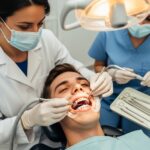Not everyone dreads going to the doctor or dentist. Some people enjoy medical and dental settings. While it may seem unusual to many, this interest has a psychological explanation. The love for medical environments and fascination with dentists can come from many different feelings and experiences.
In this article, we’ll explore why people feel comfortable or even excited about clinical settings. We’ll also look at what attracts people to healthcare professions and how positive dental experiences shape your feelings.
A Love for Medical Environments
For some individuals, medical settings bring a sense of calm and order. Hospitals and clinics should be clean, well-organized, and staffed with professionals who are dedicated to providing care for you. This structure can be comforting, especially for individuals who prefer routines and organized spaces.
The sounds of beeping machines, the smell of antiseptic, and the sight of doctors in white coats can feel familiar and reassuring rather than scary.
If you grew up spending time in medical environments due to personal or family health issues, these places became part of your everyday life over time. What might feel cold or frightening to others feels like home for you. Your love for medical environments can also come from positive memories, like getting better after being sick or seeing your loved one recover.
Fascination with Dentists
While you may fear dental visits, others are fascinated with dentists. This interest often starts in childhood. A child who has a gentle and friendly dentist might look forward to their visits.
They may enjoy the tools, the shiny chair, and even the feeling of having their teeth cleaned. These positive moments can turn into a long-term interest in dental care.
Some people are also amazed by what dentists do. They can relieve pain, fix a broken tooth, or make a smile look beautiful. Watching them work can feel like seeing magic happen.
For others, the fascination with dentists comes from a love of precision and detail. Dental work requires careful hands and sharp eyes, and this kind of skill can be impressive to watch.
Enjoying Clinical Settings
Enjoying clinical settings goes beyond liking doctors and dentists. It’s about the whole environment.
If you see clinical settings, you will appreciate how everything is clean, well-organized, and purposeful. By this, you may also feel a sense of safety, knowing they’re in a place designed to take care of you.
On the other hand, some of you will be naturally curious about the human body and how it works. Being in a clinical setting allows you to see medical tools, charts, and equipment closely. This may satisfy your satisfaction in learning about health, treatments, and the science behind medicine. For those of you, a clinic is not a place of fear; it’s a place of learning and discovery for your natural health.
Clinical settings can also create a feeling of being cared for. Nurses check vital signs, doctors ask you questions, and dental assistants offer support; all of this shows that someone is paying attention to your health. This care can feel comforting and make you want to return, even if there’s a little discomfort involved.
Attraction to Healthcare Professions
Your attraction to healthcare professions often starts with a love for medical environments. If you are enjoying being around doctors, hospitals, or dental offices, you may dream of working in these places. You want to be a part of the team that helps others feel better.
You are drawn to healthcare because you want to make a difference. Seeing doctors and dentists improve people’s lives can be inspiring for you. That’s why you want to do the same. Others like the idea of solving puzzles, figuring out what’s wrong, and finding a solution. This mental challenge is exciting and rewarding for many of you.
Your attraction to healthcare professions is also tied to respect. Doctors, nurses, and dentists are often seen as smart, caring, and hardworking. When you admire these traits, the desire to be like them is strong. You may start by enjoying clinical settings, and later, you can decide to pursue a career in medicine or dentistry.
Positive Dental Experiences
A big reason why some of you enjoy going to the dentist is that you’ve had positive dental experiences. If your first few visits were pain-free, kind, and even fun, it will create a strong and lasting impression on you. These experiences can remove your fear and replace it with trust.
Dentists who take the time to explain what they’re doing, speak gently, and show care can make a big difference. A child who gets a small toy after a checkup or an adult who feels relief from pain might come to associate dental visits with good outcomes.
Positive dental experiences also include cosmetic changes. If you get braces, teeth whitening, or dental implants and see a great improvement in your smile, you may feel very thankful and excited. They might even look forward to follow-up appointments just to see the progress.
Some people also enjoy the feeling of cleanliness after a dental cleaning. The smooth teeth, fresh breath, and polished look can be satisfying. Over time, you will begin to see dental visits as a form of self-care rather than something to avoid.
Psychology Behind the Fascination
So, what’s the psychology behind this fascination? It often comes down to early experiences, personality traits, and personal values.
- Positive associations: When your medical or dental settings are linked to good memories, the brain sees them as safe and even enjoyable places.
- Curiosity and learning: People who are naturally curious and love learning may be drawn to the complexity of healthcare. They will enjoy watching procedures, asking questions, and discovering how their bodies work.
- Desire for control and order: Clinical environments are highly controlled, with clear rules and structure. For you people, if you like predictability and neatness, these settings feel very comfortable for you.
- Helping others: The main reason you are fascinated by healthcare is that they value kindness and helping others. Being around people who heal and care inspires them and gives them hope.
- Role models: A caring doctor or a skilled dentist can become a role model. You want to be like them and are inspired by their work.
Conclusion
While fear of doctors and dentists is common for people, you will feel the complete opposite. Your love for medical environments, fascination with dentists, and enjoyment of clinical settings often come from positive past experiences, curiosity, and a desire to help others. These feelings can grow into a deep attraction to healthcare professions and a lifetime of appreciation for the people who work in them.
Understanding this fascination helps you see that medical and dental settings can be places of wonder, safety, and inspiration, not just fear and discomfort. Whether it starts with a kind dentist or a deep interest in science, the journey from patient to admirer or even to healthcare professional shows the powerful role psychology plays in our daily lives.



